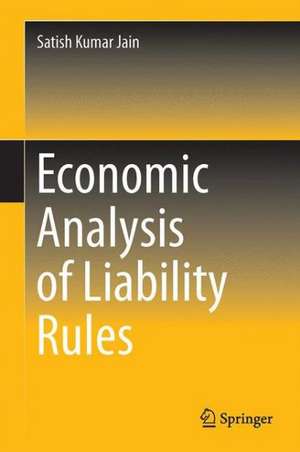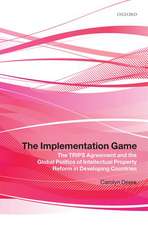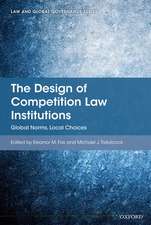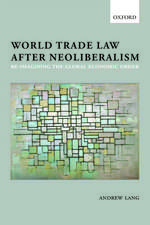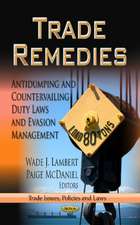Economic Analysis of Liability Rules
Autor Satish Kumar Jainen Limba Engleză Hardback – 12 dec 2014
The economic analysis of tort law has established that for efficiency it is necessary that each party to the interaction must be made to internalize the harm resulting from the interaction. The characterization and impossibility theorems presented in this book establish that, in addition to internalization of the harm by each party, there are two additional requirements for efficiency. Firstly, rules must be immune from strategic manipulation. Secondly, rules must entail closure with respect to the parties involved in the interaction giving rise to the negative externality, i.e., the liability must not be decoupled.
| Toate formatele și edițiile | Preț | Express |
|---|---|---|
| Paperback (1) | 382.18 lei 6-8 săpt. | |
| Springer India – 23 aug 2016 | 382.18 lei 6-8 săpt. | |
| Hardback (1) | 389.49 lei 6-8 săpt. | |
| Springer India – 12 dec 2014 | 389.49 lei 6-8 săpt. |
Preț: 389.49 lei
Nou
Puncte Express: 584
Preț estimativ în valută:
74.55€ • 81.01$ • 62.66£
74.55€ • 81.01$ • 62.66£
Carte tipărită la comandă
Livrare economică 21 aprilie-05 mai
Preluare comenzi: 021 569.72.76
Specificații
ISBN-13: 9788132220282
ISBN-10: 8132220285
Pagini: 300
Ilustrații: IX, 180 p. 8 illus.
Dimensiuni: 155 x 235 x 17 mm
Greutate: 0.45 kg
Ediția:2015
Editura: Springer India
Colecția Springer
Locul publicării:New Delhi, India
ISBN-10: 8132220285
Pagini: 300
Ilustrații: IX, 180 p. 8 illus.
Dimensiuni: 155 x 235 x 17 mm
Greutate: 0.45 kg
Ediția:2015
Editura: Springer India
Colecția Springer
Locul publicării:New Delhi, India
Public țintă
ResearchCuprins
Chapter 1. Introduction.- Chapter 2. Efficiency Criteria.- Chapter 3. The Structure of Efficient Liability Rules.- Chapter 4. Decoupled Liability and Efficiency.- Chapter 5. Negligence as Failure to Take Some Cost-Justified Precaution.- Chapter 6. The Structure of Incremental Liability Rules.- Chapter 7. The Negligence Rule.- Chapter 8. Decomposition of Loss and a Class of Negligence Rules.- Chapter 9. Multiple Injurers and Victims.- Chapter 10. Epilogue.
Recenzii
“The book under review is an excellent text which deals with some key topics in the field of law and economics … . most fascinating element of this book is its elegant framework of analysis which is simple and yet quite general and rigorous. … This book has the potential to foster further study of law and legal system … . It is highly recommended for those who are looking for research agenda in the field of law and economics.” (Papiya Ghosh, Indian Economic Review, Vol. 52, 2017)
Notă biografică
Satish K. Jain is Professor at the Centre for Economic Studies and Planning, Jawaharlal Nehru University (JNU), New Delhi, India. He did his Master’s in Economics from Delhi School of Economics, and Ph.D. from the University of Rochester, USA. His areas of interest are law and economics, and social choice theory.
Textul de pe ultima copertă
This book focuses on the analysis of liability rules of tort law from an efficiency perspective, presenting a comprehensive analysis of these rules in a self-contained and rigorous yet accessible manner. It establishes general results on the efficiency of liability rules, including complete characterizations of efficient liability rules and efficient incremental liability rules. The book also establishes that the untaken precaution approach and decoupled liability are incompatible with efficiency.
The economic analysis of tort law has established that for efficiency it is necessary that each party to the interaction must be made to internalize the harm resulting from the interaction. The characterization and impossibility theorems presented in this book establish that, in addition to internalization of the harm by each party, there are two additional requirements for efficiency. Firstly, rules must be immune from strategic manipulation. Secondly, rules must entail closure with respect to the parties involved in the interaction giving rise to the negative externality, i.e., the liability must not be decoupled.
The economic analysis of tort law has established that for efficiency it is necessary that each party to the interaction must be made to internalize the harm resulting from the interaction. The characterization and impossibility theorems presented in this book establish that, in addition to internalization of the harm by each party, there are two additional requirements for efficiency. Firstly, rules must be immune from strategic manipulation. Secondly, rules must entail closure with respect to the parties involved in the interaction giving rise to the negative externality, i.e., the liability must not be decoupled.
Caracteristici
Presents a comprehensive analysis of liability rules Contains complete characterizations of efficient liability rules and efficient incremental liability rules Establishes that the untaken precaution approach as well as decoupled liability are incompatible with efficiency Includes supplementary material: sn.pub/extras
